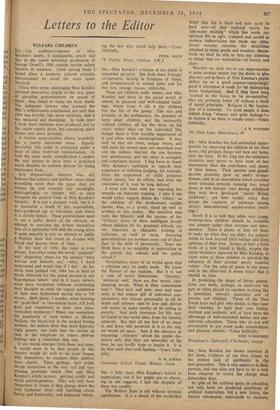SIR,—Miss Kendon's criticism of her pupils is somewhat perverse. She
finds them boringly co-operative, lacking in freshness of vision, and inexperienced in mental pain; and for this last, strange reason, unlovable.
These are children under twelve, and Miss Kendon sees them in the social world of school, in pleasant and well-adapted build- ings, where from 9 till 4 the children live the life of the group. The size and urbanity of the architecture, the presence of forty other children, and the necessarily ordered routines, all lay the stress on the social rather than on the individual life, though there is little forcible suppression of it and often much encouragement. It may well be that the fresh, unique vision, and still more the mental pain, are smoothed over and the outlines blurred; the one becomes less spontaneous, and the other is assuaged, and sometimes healed. I beg leave to doubt Miss Kendon's optimism as regards their experience of suffering (judging, for example, from the experience of child guidance clinics alone), but its effects, and even the awareness of it, may be long delayed. I must join issue with her regarding her remarks on character training. I take it she would rather vaguely define the ' Others' as the children of the professional middle classes, who, as a group, stand up well to scrutiny in this matter. Her assertion that both the Ministry and the parents of her Urbans; many of them intelligent people whose children fill the grammar schools, are not interested in character training is ludicrous, as well as smug. Sweeping generalisations are nowhere more out of place than in the field of personality. Does she think there is no insipidity or materialism in the private day schools and the public school ?
Nevertheless, many of us would agree that a criticism may he justly made. We know the flavour of her malaise. But it is not
a case of social distinctions. ' Eternity,' ' immortal soul,' these are fine words, awe- inspiring words. What is their connotation here ? That here and now, once and once only, is this unique gift of individual con- sciousness, this human personality in all its depth and richness ours to love and cherish and revere, to make worthy of its setting in
eternity. And such reverence for life may he found in any social class, from the humble upwards. But that all too few of us share it. and fewer still persevere in it to the end, we would all agree. And if the educator in Grammar School House, Henley, Oxon


























 Previous page
Previous page